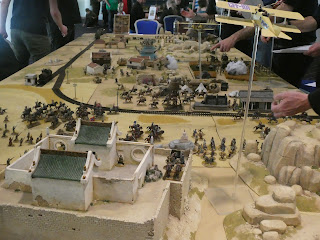The scenario for this week's game is based on the battle of Lubar, an episode in the 13 Years War between Poland-Lithuania and Muscovy. There were a series of combats spread over a number of days and this scenario comes from the Tales from a Wargames Shed blog 17th Century scenarios page (link). It involves a Polish/Lithuanian attack on a redoubt covering the flank of the main Muscovite camp. There are only 10 units per side which makes it ideal for an evening game. Statistics can be found on the blog for several rulesets, including our own preferred "Pike and Shotte".
The Polish/Lithuanian force has 4 'foreign' (ie mixed pike and shot) infantry units, 2 units of pancerni and one each of reiter, hussars and dragoons; and one field gun. The Muscovite force has 3 units of infantry, one each of streltsy, soldatski and border dragoons, plus 2 light guns and a medium gun. For cavalry they had two units of feudal levy cavalry and two of reiter. I don't have sufficient foreign infantry or reiter so some of my ECW collection was pressed into service to fill out the roster.
The Muscovite objective is to try and hold the redoubt and thus protect the camp. For the Polish/Lithuanians the seizure of the redoubt is a preliminary to the main attack on the camp. The Muscovites deploy first and opted to place the border dragoons in the camp with the medium gun and the Soldatski covering the gap between the emplacement on the hill and the camp. On their right they placed all their cavalry, leaving the streltsi and light guns to garrison the redoubt. For the Polish/Lithuanians the infantry and medium gun were deployed to attack the redoubt, the cavalry on the right to face the Muscovite cavalry, leaving the dragoons to occupy the attention of the border dragoons.
 |
| The Border dragoons defend the camp |
The Muscovite commander seized the initiative and moved his feudal levy forward, with the reiter following in support. Not willing to cede too much ground, the Polish commander ordered his pancerni to charge the oncoming Muscovites. One unit of pancerni routed their opponents, though at the cost of heavy casualties. The other melee was more prolonged with both participants slugging it out.
 |
| The feudal levy |
 |
| The pancerni |
Meanwhile the Polish infantry had advanced (rather sluggishly it has to be admitted), toward the redoubt, their reluctance probably the result of some accurate artillery fire from the Muscovite guns, backed up by volleys from the streltsi. One unit was forced to fall back to recover from its casualties, leaving just one to charge the redoubt. Their attack didn't reach the ramparts, the devastating fire from the defenders routing the attackers before they could strike home.
 |
| The first attack on the redoubt is repulsed |
Undaunted the Polish infantry commander launched a second attack, both units charged, but once again the defenders fire stopped them in their tracks.
 |
| The second attack also fails |
On the flank, the cavalry duel continued. The Muscovite commander brought forward his reiter and the pancerni who had driven off the feudal levy counter-charged them. In a rather one-sided melee the pancerni were driven from the field and the Polish cavalry commander had to commit his hussars to try and stem the tide. Perhaps over-eager, the hussars became disorganised as they charged forward and thus their impact was not as decisive as it should have been. Against the odds, the reiter held and were then reinforced by the second regiment.
 |
| The Hussars charge the reiter |
On the hussars' left, the remaining feudal cavalry had driven back the pancerni and therefore the Polish cavalry commander had to commit his reserve, the reiter to try and buy time for the pancerni to recover. Their performance was a disappointment. Even though the feudal cavalry received the charge at the halt, they beat off the Polish reiter, inflicting such heavy casualties that they fled the field. Things did not improve for the Poles, as the vaunted hussars were overwhelmed by the combined efforts of both Muscovite reiter units and they joined the growing number of Polish cavalry units fleeing the field.
 |
| But when the reiter are reinforced, it proves too much |
At least the Polish dragoons were occupying the attention of the border dragoons and also one of the foreign regiments disordered the soldatski with a volley and then advanced towards them. A second volley routed them, opening up the flank of the redoubt.
 |
| The soldatski break |
Even the attack on the redoubt was at last making progress. The defending streltsi had been gradually whittled down by volleys from the foreign regiments and eventually they routed. Seizing their chance one of the foreign regiments charged forward and when one of the light guns disabled itself with a final shot, they were able to take the redoubt.
 |
| The redoubt is finally taken |
It counted for nothing as on the flank, the Muscovite cavalry had achieved complete control. A final, desperate charge by the remaining pancerni regiment had checked one of the reiter regiments, but at a cost of themselves taking horrendous casualties and routing from the field. The Poles cobbled together a flank with one foreign regiment and the gun facing the cavalry, but there was really no alternative but to retreat. A Muscovite victory was declared.
A most enjoyable scenario where the Polish advantage in numbers was offset by the Muscovite defences. As always there were points in the game where things could have gone differently, but we both felt we had a chance of victory.


























